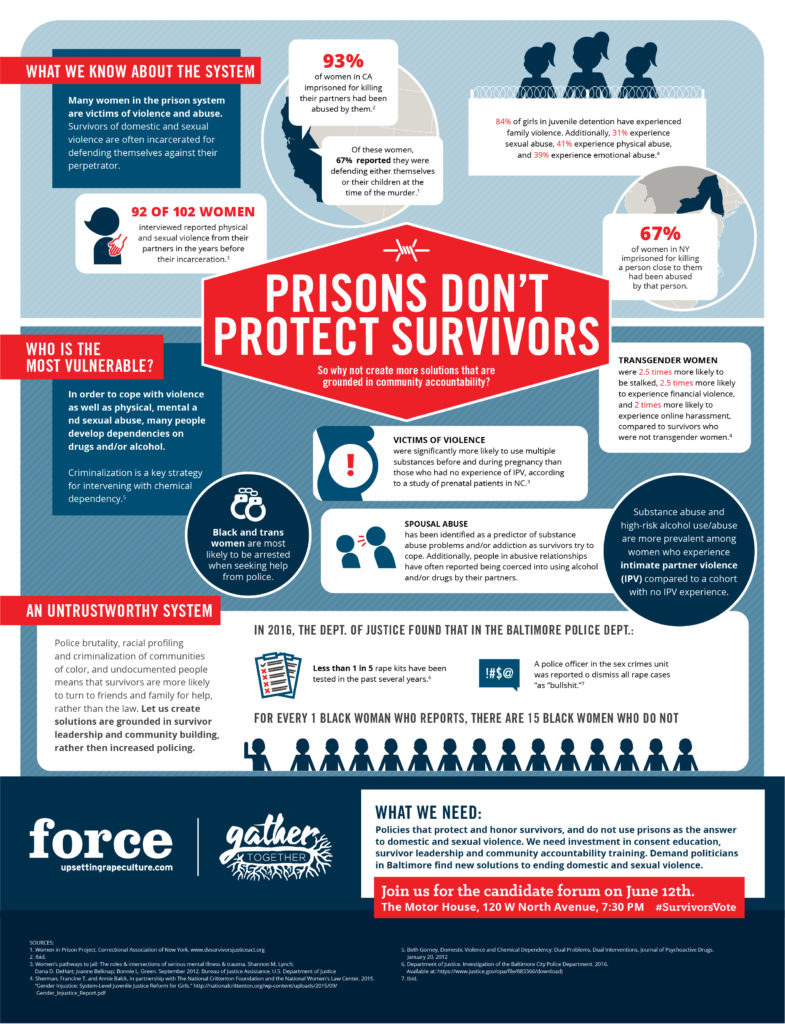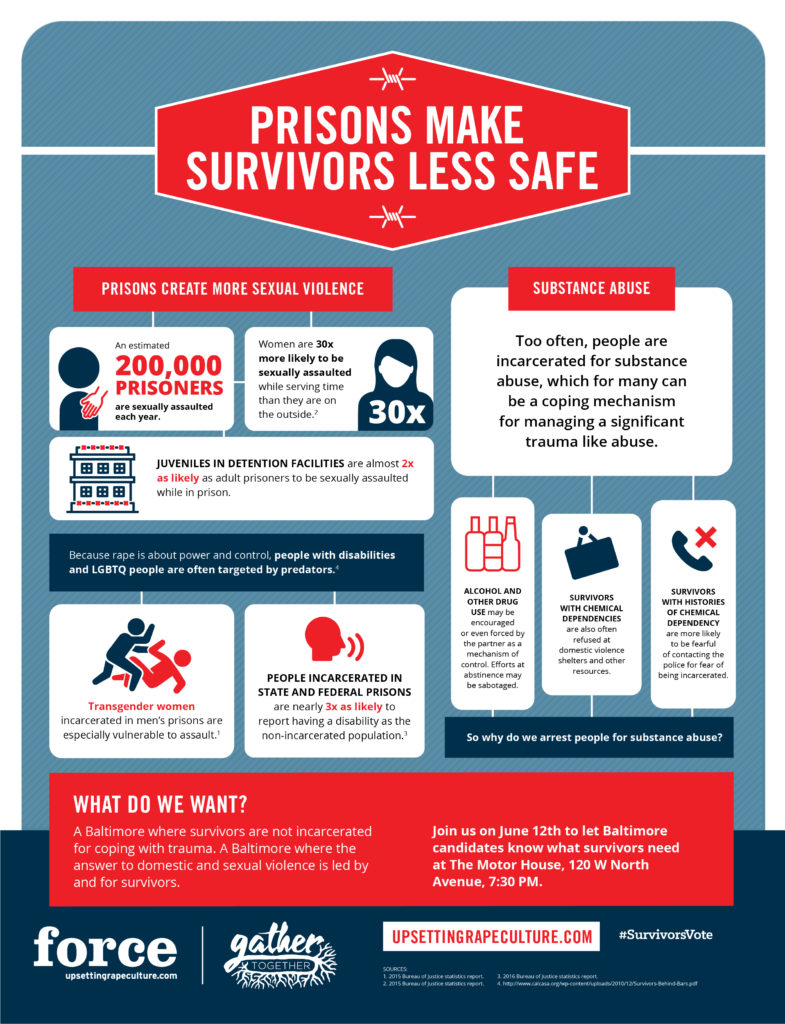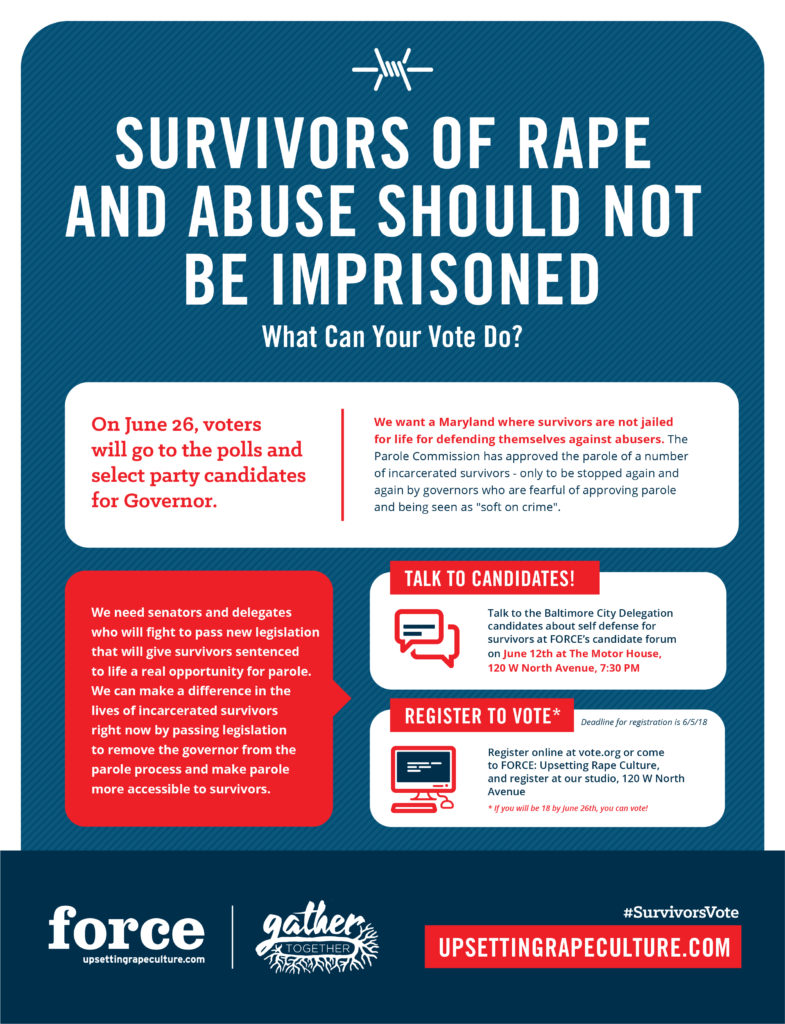2018
In the lead up the the 2018 midterm elections, FORCE organized a social media campaign the educate voters about issues that impact survivors in Maryland. These inforgraphs were designed by Michelle Ghiotti in collaboration with FORCE staff.
In addition to these infographics, as part of the Listening Campaign to Disrupt Rape Culture, FORCE: Upsetting Rape Culture asked our candidates for office to respond to a series of questions about ending rape culture, supporting victim-survivors of sexual and intimate partner violence, and how they will address specific intersections between sexual and intimate partner violence and other social justice issues.
We asked 50 candidates in Maryland across all parties, running for offices like governor, attorney general and state legislature. Out of those 50, 11 candidates responded. You can see an overview of all candidates who were asked to respond to our survey here.
Below, we’ll share information about what we learned from the candidates who did take the time to respond, but before we do that, we want to share some lessons learned.
- Victims-Survivors in Maryland Deserve Better. There were 38 candidates who refused to respond to this survey. Politicians seeking to represent us must be willing to talk to us. Survivors vote.
- Are Candidates Listening? Our work in the listening campaign showed us that candidates often seem disengaged from the issues that are central to the lives of survivors. Only 2 candidates running for the Baltimore Delegation to the State Legislature showed up for a rape culture forum we hosted in June. We invited all 15 candidates. This is unacceptable. We must be heard.
- Victims-Survivors Must Lead the Way. If candidates are unwilling to listen to us, we have to become the candidates. We deserve legislators that will fight to end sexual and domestic violence, and hold hope that a different world can exist.
Candidate Responses
We are deeply grateful to the 11 candidates who responded to our questionnaire:
Governor and Lt Governor – Green – Ian Schlakman and Annie Chambers
US Senator – Green – Mia Mason
US Senator – Unaffiliated – Edward Shlikas
US Senator – Unaffiliated – Michael Puskar
Congressional District 02 – Dutch C.A. Ruppersberger
Congressional District 04 – George McDermott
Congressional District 04 – Dave Bishop
Congressional District 05 – Patrick J Elder
Congressional District 05 – Amie Hoeber
Remember to VOTE on November 6th! Want to join our work to end rape culture in Baltimore City and beyond? Learn more about our Listening Campaign.
These are the questions we asked:
Question 1 : What are the most important challenges facing victim-survivors of sexual and/or intimate partner violence in Baltimore City and how do you propose to address them? *
Question 2 : What actions have you personally taken to support victim-survivors of sexual assault and intimate partner violence in Baltimore City? *
Question 3 : Sexual violence and intimate partner violence are cross cutting issues that deeply impact already vulnerable communities, particularly people of color, LGBTQ populations and others. If elected, what kind of policies, if any, will you pursue to promote support for victim-survivors? *
Question 4 : Would you support legislation so that people reporting sexual or intimate partner violence cannot be arrested and/or detained, either for self defense, immigration status, prostitution, drug use, or any other crime that may have engaged in before or during the assault?*
Question 5 : Intimate partner violence has been identified as a predictor of substance abuse problems and/or addiction as victim-survivors try to cope, thereby increasing the risk that survivors may be arrested for chemical dependency. What legislation or actions would you propose to address this intersection of chemical dependency and intimate partner violence or sexual assault? *
Question 6 : In what ways would you offer support to undocumented victim-survivors? *
Question 7 : What kind of comprehensive training about sexual and intimate partner violence would you require for law enforcement? *
Question 8 : Do you support legislation that would allow those convicted of human trafficking to vacate convictions related to their trafficking? Why or why not? *
Question 9 : Do you support legislation that would give employees who are victim-survivors of sexual assault, intimate partner violence and stalking to take earned paid time off to address the issues related to the violence? Why or why not? *
Question 10 : Do you support legislation that would support victim-survivor privacy by amending the Maryland’s Public Information Act as it applies to images captured by law enforcement body cameras? Why or why not? *
Question 11 : How will you help victim-survivors who are refugees access services within their community? *
Question 12 : Do you support legislation that would require public officials to respond to requests for a certification of helpfulness within 90 days? Requiring public officials to respond to requests for a certification of helpfulness within 90 days. Certifications of helpfulness are used in U Visa applications, which are available to persons in the US without status who are victims of violent crime and assist with prosecution. Survivors of rape, incest, human trafficking, and other sex crimes are among those eligible. *
Question 13 : Do you agree with the need for providing rape victim-survivors with PrEP treatments for 28 days as emergency treatment to prevent HIV infection? Why or why not? *
Question 14 : Victim-survivors consistently report that services designed to aid and help them often have long wait lists and criterion that exclude a number of would-be clients (this is a particularly urgent issue within transgender populations, individuals with chemical dependencies, those experiencing homelessness, communities of color and people with felony charges). Given the dearth of funding allocated to these agencies, and the ever-growing needs, how would you prioritize funding for our communities? *
Question 15 : Studies show that when children have access to comprehensive sex education which includes curriculum on consent, healthy relationships, and is affirming of gender identity/expression, they are less likely to become victim-survivors of childhood sexual abuse. How would you improve Maryland’s sex education? *



